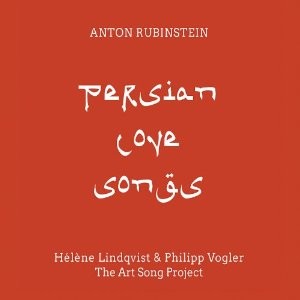 by Philipp Vogler
by Philipp Vogler
Last spring, as I was looking through the library of the University of Music in Munich, I found two books with songs by the russian composer Anton Rubinstein. The volumes were beautifully bound in a dark green cover with the name „Leo Slezak“ embossed in gold. Hélène and I had already recorded Rubinstein‘s song „Morgenlied“ for our Art Song Project. To find that the great tenor Leo Slezak, widely famous as well for his opera as well as for his art song performances, had sung Rubinstein songs made me very curious, so I brought the volumes home with me to show Hélène.
With a nice glass of wine we set out to play and sing through the first volume. We started with the Heine-songs Op. 32. The more songs we went through, the more excited we got. We discovered a composer whose richness of ideas seemed to expand with every single song we tried out. The composer of the famous „Melodie in F“ suddenly appeared in a new light: Rubinstein obviously was highly educated in music and literature, and very influenced by classicism.
Many songs reminded us of Mendelssohn and others of Schumann, and yet this was a musical language of its own. The expression of Rubinsteins songs is based on the concentration on a very clear musical form. We noted that Rubinstein must have had a fondness of the octave as a form element, almost as if he had used it as his signature. As a result, we had fun looking out for new places exposing the octave motif.
A great discovery still awaited us: the Persian Songs Op. 34. Like other 19th century composers, Rubinstein must have been fascinated by the exotic color of the poetry, and of the possibility to create similarly exotic sounds to match. But contrary to other colleagues of his, he succeeded in integrating this exotic flavor in his own musical language, without the foreign elements sounding strange or artificial. Hélènes father is egyptian, so she was happy to find these songs for this reason as well.
We couldn‘t decide which of all the beautiful songs we would put on our Art Song Project. Why not present Rubinstein more in depth? So we decided to produce our own CD.
The sound engineer Robert Schneider already made us feel great way back when we recorded our first CD with songs by Alban Berg. He is a true wizard of his craft. We met up with him and showed him the songs, and asked if he‘d join us. He was totally enthusiastic, and so we recorded the Rubinstein songs on three very warm days in July in the auditorium of the University of Music in Munich.
Doing research for the project, Hélène found the article „The songs by Mirza-Schaffy and the Opus 34 by Anton Rubinstein – between folklore, nationalism and orientalism“ by Nadejda Lebedeva, published in the „Archives for musical science“. Hélène contacted her and told her about our recording. She was happy to hear that a production of the songs in the original version was finally being made, and promised to write an introduction for us.
We like to thank Nadejda Lebedeva, Robert Schneider, and all the other people who have helped us create our first „indy“ CD, and we wish you, dear listeners, as much pleasure listening to our recording as we had making it.
Comments
Hi John!
What delightful news! I’m happy we could be of service 🙂 – and we’ll definitely send a copy to “The American Record Guide” as soon as we can.
About the tempi: “Mein Herz schmückt sich mit dir” is a “Moderato con moto (moderate with movement)” – which can of course be seen in many ways, as there is no fixed metronome tempo attached. The basic base rhythm works well in a slower tempo as well as a faster one. But we felt the motive of the initiating /16s in the left hand needed a faster tempo to sound natural and purposeful. A faster tempo also let us express an “emotional” con-moto of sorts.
I’ve been waiting for this recording for 30 years! I have admired Anton Rubinstein since I first heard his once-popular 4th Piano Concerto as a teenager. Somehow, around the same time, I stumbled across an album of his songs that included Op, 32, 34, and 36. I would play “Die Asra” and “Mein Herz Schmückt Sich mit Dir” on the violin, basking in their exotic orientalism. “Surely,” I thought, “someone will record these some day.” Now, 30 years later…
I am curious about your tempos. There actually have been a few recordings of songs by Rubinstein here and there over the years, and there is even an ancient Melodiya LP of the Persian Songs. In both recordings of “Mein Herz Schmückt Sich mit Dir” that I know of the performers take it at about 60 beats per minute, but your recording clocks in at about 92. I can’t find my score, but then Rubinstein is notoriously vague about his tempos: things marked “Moderato con fuoco” and such. What was your approach to the tempo problem? I must say, too, that the song works both ways. At 60, it’s almost melancholy and nostalgic; at 92 it’s impassioned.
You should submit a copy for review to “American Record Guide”. I wrote vocal criticism for them for 12 years and have can attest that they have a knowledgable vocal staff.